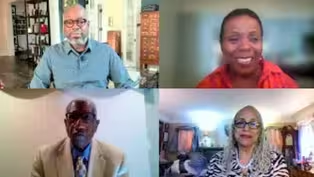
'Aging While Black' Author Raymond Jetson discusses his new book and caring for Black elders
Clip: Season 53 Episode 28 | 7m 53sVideo has Closed Captions
“Aging While Black” author Raymond Jetson talks about caregiving in the Black community.
"Aging While Black” author Raymond Jetson talks with "American Black Journal" host Stephen Henderson about the unique experiences of African Americans as they age and how it impacts their caregiving. They talk about the systemic inequities and cultural expectations surrounding caregiving in the Black community. Plus, Jetson shares what he's learned during his journey as a caregiver for his mother.
Problems playing video? | Closed Captioning Feedback
Problems playing video? | Closed Captioning Feedback
American Black Journal is a local public television program presented by Detroit PBS

'Aging While Black' Author Raymond Jetson discusses his new book and caring for Black elders
Clip: Season 53 Episode 28 | 7m 53sVideo has Closed Captions
"Aging While Black” author Raymond Jetson talks with "American Black Journal" host Stephen Henderson about the unique experiences of African Americans as they age and how it impacts their caregiving. They talk about the systemic inequities and cultural expectations surrounding caregiving in the Black community. Plus, Jetson shares what he's learned during his journey as a caregiver for his mother.
Problems playing video? | Closed Captioning Feedback
How to Watch American Black Journal
American Black Journal is available to stream on pbs.org and the free PBS App, available on iPhone, Apple TV, Android TV, Android smartphones, Amazon Fire TV, Amazon Fire Tablet, Roku, Samsung Smart TV, and Vizio.
Providing Support for PBS.org
Learn Moreabout PBS online sponsorship- Welcome to "American Black Journal."
I'm your host, Stephen Henderson.
Last month, "American Black Journal" hosted a live virtual town hall on caregiving.
It was part of our Black Church in Detroit initiative, and it coincided with the premier of the PBS documentary titled "Caregiving" from actor Bradley Cooper.
Our panel of guests talked about a family caregivers project that's creating 100 caring congregations in Detroit's Black churches.
We also discussed respite for caregivers, financial and legal services, and the unique challenges faced by aging African Americans.
Here's a clip from the documentary, followed by excerpts from the town hall.
(wind rushing) (peaceful music) - [Malcoma] The king is here!
Come on.
One.
Two.
Three.
Don't fall.
- I don't know what number I'm on now.
- Six.
Seven.
Eight.
I'm a wife that's caring for my husband.
24/7.
Whoa.
16.
Good job, man!
Good job.
We're going this way.
Today is our 21st anniversary.
You gonna dance with me?
- Mhm.
- Dance with me.
(gentle piano music) He was diagnosed with a neurological disorder.
There is no cure.
(gentle piano music) I cry, but never let him see me cry.
Good job.
I'm like, "Okay, girl.
Let's get it together."
You ready to get shaved?
- Mhm.
- All right.
Now I'm doing total care.
Helping him to walk, cleaning him, bathing him.
Thank God for your feet.
Right?
You can walk.
The entire process has been mentally draining.
Physically draining.
One more.
Yeah.
To the point that I could no longer work.
Okay, Ken.
Insulin time.
It took everything that we had left.
My credit card debt went from maybe $2,000 to over $30,000.
You ready?
- Mhm.
- The journey's been tough, but it made me fall more in love with him.
Lay back.
I got you.
Even though he was disappearing, it's like our love was growing.
(peaceful music) You too!
Where we are now is that he has deteriorated to the point that he needed hospice care.
One more.
Finally, there's help.
You can get lotion, razors, any type of continence supplies, as well as a home health aide that can come in and make it a little bit easier.
But as of last Wednesday, I was told that he will be released from hospice.
All of the assistance that was in place for him was gonna be gone.
You'll color a picture for me?
The social worker said that he's not deteriorating fast enough.
Color the bus.
No, no, no, you can't eat that.
You're gonna color the bus.
Come on.
(peaceful music) I'm like, "What?
He's not getting better.
He's getting worse.
What's the problem?"
(dial tone) - [Operator] Welcome to Medicare.
Briefly tell me the reason for your call today.
- I had some questions in reference to when you're released from hospice.
(muffled phone operator dialogue) What do you mean by that?
Okay, so basically, it's based on how many days you have left, and if you're not dead by that time, then you gotta come off.
- [Operator] Correct.
(peaceful music) - Now say that back to yourself and tell me how that sound.
- [Operator] I...
It... Uhh... - We want to to start with an overall look at the unique challenges that are faced by African Americans when they reach their golden years.
Joining me now is author Raymond Jetson, whose new book is titled "Aging While Black."
Raymond, welcome to our town hall.
- Stephen, thank you so very much.
It is a joy to connect with you and to be a part of this important conversation.
- Yeah, yeah.
So, let's start here.
"Aging While Black," the title itself intimates the unique circumstances that African Americans face in this space, caregiving.
Of course, I always say that if you take any situation and add race or racial dimension to it, race is often an aggravator in that situation.
It makes things more difficult, more challenging, or worse.
Talk about the unique circumstances here that affect aging for our community.
- So, thank you again.
I would say, in the book that I just wrote, the top line statement is that aging in America is not a race-neutral experience.
And so very often we talk about aging and the critical components of aging as if it is a universally shared experience.
And the reality is that, for African Americans, the American experience has been different in every way.
So, why wouldn't it be when it comes to aging?
And in particular as it relates to caregiving, we, first of all, find the tension between the systemic inequities that exist and the cultural expectations that are attached to caregiving.
And so the economic strain that caregiving places, especially on Black women who reduce their work hours or exit the workforce earlier to provide caregiving services to family members and loved ones, which leads to lower retirement savings and financial insecurity later in life.
We have health disparities, which are well-documented, that Black elders are more likely to experience chronic conditions that require caregiving.
And you couple that with the complex needs in a healthcare system that lacks cultural competency, as a general statement.
You'll see how these things are aggravated.
And then in terms of our community, that is the strong cultural value placed on taking care of our own, which causes people to oftentimes bear circumstances in ways that are not healthy for them or the people in which they seek to provide care.
And then, lastly, I would suggest that Black elders and caregivers are often overlooked or underrepresented in mainstream aging services.
And this cacophony of circumstances creates a situation where aging while Black and caregiving while Black is aggravated greatly.
‘100 Caring Congregations’ initiative provides training and resources to church leaders
Video has Closed Captions
Clip: S53 Ep28 | 7m 16s | 100 Caring Congregations project trains Black church leaders to be caregiving advocates. (7m 16s)
Financial, legal and self-care experts share resources available to Michigan caregivers
Video has Closed Captions
Clip: S53 Ep28 | 8m 43s | Financial, legal and self-care experts share resources available to Michigan caregivers. (8m 43s)
Providing Support for PBS.org
Learn Moreabout PBS online sponsorshipSupport for PBS provided by:
American Black Journal is a local public television program presented by Detroit PBS













